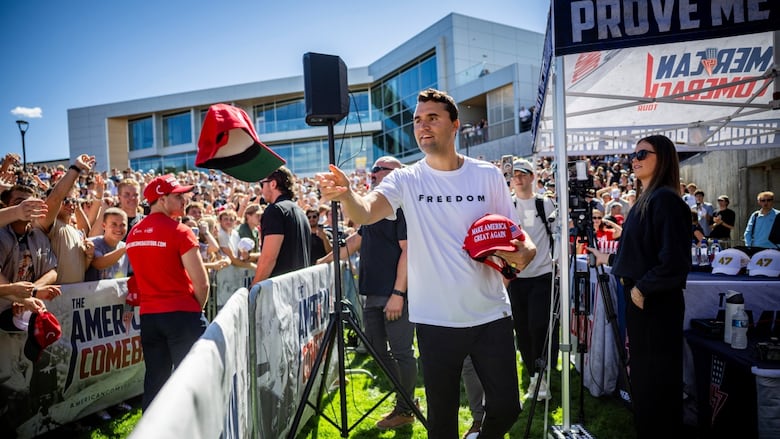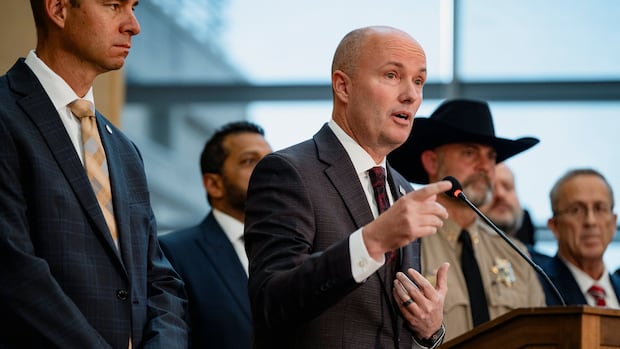
Social Sharing
The gory as the news itself.
As people grappled with Wednesday's fatal shooting of right-wing political activist Charlie Kirk — with the graphic video of the incident available almost instantly online — the question many of us asked each other wasn't necessarily,"Did you hear?" but,"Did you watch it?"
Tens of millions of people have watched the moment Kirk was shot in the neck — whether inadvertently or not — and among them are children and teens with easy access to social media. But it's also showing deadly violence easily accessible online.
The stabbed to death last month on a train in North Carolina is just another recent example.
The American Academy of Pediatrics estimates that by the time children reach middle school,"they may have watched as many as 8,000 murders and 100,000 other acts of virtual violence through the media." Virtual violence, they explain, includes any act of aggression absorbed through TV, movies, video games, social media and other digital channels, including news reports.
So for a generation of kids that's never been more connected, many parents may be wondering: has it simply become unavoidable for them to see this type of gruesome content? And how can we protect them?

"The unfortunate reality these days, with the significant reduction in content moderation across several major platforms, is it's just really hard to avoid this entirely," said Kara Brisson-Boivin, the director of research at Canadian media literacy group MediaSmarts.
While acts of violence displayed in the news or on media platforms aren't new, the sheer volume of it and the"sheer voracity" at which we're exposed to it is, Brisson-Boivin told CBC News.
"Frankly, it's not good for any of us," she said.
'Social media is a cancer,' says Utah governor
Kirk was shot at a public event before hundreds of people at a Utah university campus, many of them holding up phones to record a celebrity in their midst and savvy about how to disseminate video evidence of a news event.
Video was easy to find on X, Facebook, TikTok, Instagram, YouTube — even Truth Social.
As digital media news site Wired points out, social platforms have scaled back their content moderation efforts over the past two years, sometimes replacing human moderators with AI. And this puts the onus on users to mitigate the content they see online, says MediaSmart's Brisson-Boivin.
"In this adult world, you could easily think that it's very easy to protect yourself from this, of course you don't have to look at it, of course, you can turn away," Kris Perry, executive director of Children and Screens: Institute of Digital Media and Child Development, told The Associated Press.
"But what's happening with children, especially in social media contexts, is that the algorithms are so sophisticated and the feed is so tailored to them that you should assume your child has been exposed to this event through a source that you did not choose."
WATCH | Utah governor calls social media 'a cancer' in Kirk news conference: 
'Social media is a cancer,' says Utah governor after Kirk shooting video
9 hours ago
Speaking to reporters Friday, Utah Governor Spencer Cox decried the widely available video of right-wing political activist Charlie Kirk being shot, calling social media 'a cancer' and saying, 'This is not good for us.'
Spencer Cox, the governor of Utah, didn't mince words in a news conference Friday when asked if he thought Kirk's shooting would be a watershed moment in history. He pointed to past political assassinations in the U.S., such as when John F. Kennedy was shot, but noted"having one so gruesomely displayed on camera in all of our hands and in all of our pockets," amplified the experience.
"We are not wired as human beings, biologically, historically, we have not evolved in a way that we are capable of processing those types of violent imagery," he said.
"This is not good for us. It is not good to consume. Social media is a cancer."
YouTube previously told The Associated Press it was removing "some graphic content" related to the event if it doesn't provide sufficient context, and restricting videos so they could not be seen by users under age 18 or those who are not signed in.
Meta's rules don't prohibit posting videos like Kirk's shooting, but warning labels are applied and the videos are not shown to users who say they are under 18. The parent company of Instagram, Facebook and Threads referred a reporter to the company's policies on violent and graphic content, which they indicated would apply in this case, but had no further comment.
An X representative did not immediately return a request for comment. A spokesperson for TikTok told Wired they were saddened by Kirk's shooting, and"remain committed to proactively enforcing our Community Guidelines," as well as implementing additional safeguards to "prevent people from unexpectedly viewing footage that violates our rules."
Can parents do anything?
That said, despite our increasingly digital environment making exposure easier than ever, parents can still mitigate what their kids see online, said Brisson-Boivin.
First, given the decrease in content moderation, it's important to report any graphic content on whatever platform they saw it on, she explained. Parents should also turn off autoplay options on video or social media platforms used by their kids, she said, check the filters, and that you've entered the correct age of the child or teen using them so the platform is more likely to curate content that's age-appropriate.
But the most important step is to talk to children about violent content in the media, she added, and ask them how they're feeling about topics in the news — because chances are, they're hearing about it, if not seeing it themselves.

The Canadian Pediatric Society notes that children who see media or social media coverage of a public tragedy might worry it will happen again, that they'll be separated from their family or that someone they know will be hurt or die.
"Even kids or teens not directly affected by a tragedy can become traumatized when repeatedly exposed to horrific images or videos on social media," the society explains on its website.
There's also the risk for desensitization, where kids might perceive violent events as normal, Brisson-Boivin said.
The Canadian Pediatric Society, various mental health experts online and Brisson-Boivin all suggest social media breaks to avoid feeling overwhelmed — and not just for kids.
"I don't think we have a responsibility to witness every instance of violence that happens," therapist Erik Anderson told USA TODAY."People kind of need to be responsible for understanding what's going to trigger them and what they're able to tolerate."

